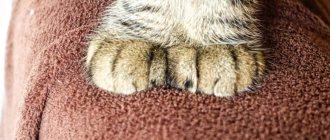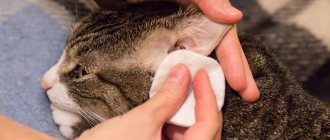Cats are playful, but they can also be unpredictable. They have strange habits: for example, they bring gifts in the form of caught prey or hide under blankets.
Why do cats do this? Perhaps they are looking for warmth, want to engage you in a game, or because they feel safe there. It's adorable, although sometimes cats can be a little intrusive.
Ambush hunting
Representatives of the cat family are not physiologically adapted to long, exhausting running and prolonged pursuit of prey, preferring hiding to catching up. Even the legendary cheetah sprinter sneaks as close to its prey as possible for a short, quick lunge.
Ambush hunting is common to all cats, and a domestic cat may suddenly imagine itself as a lion, jumping out from under the blanket after some moving object. Young active animals are especially prone to hunting games, loving to arrange a safari on a vacuum cleaner brush or the ankles of the mistress.
Sometimes cats can hide food in secret places, stocking up for a “rainy day,” so finding a dried piece of raw meat in their bed is a common occurrence for a cat owner.
Sweet Dreams
Zoologists know that relatives of domestic cats are also prone to hiding, doing this for various reasons:
- Rest after the hunt. In nature, cats spend most of the day (from 18 to 20 hours) resting after hunting. During sleep, the animal is especially vulnerable, and therefore beds are arranged in hidden and hard-to-reach places. For cats in their natural environment, this could be a hole, an old hollow, a fork in large branches with dense foliage, or a rock crevice. The animal feels protected when the walls of the shelter touch the body. Most often, cats doze with their eyes closed, without turning off their sensitive “inner guard,” but for health and recuperation, complete relaxation and a deep sleep phase are necessary.
- Call of the Ancestors. It is this property that makes a domestic cat settle down to rest in a secluded place, which can be a hole-house, a basket with a woolen blanket or a blanket on the owner’s bed.
- Feeling of warmth and safety. The desire to surround themselves with a cozy “cocoon” is characteristic of cats of all ages, but small kittens are especially sensitive to touch, instinctively striving for something warm and soft, reminiscent of their mother’s fluffy side. Warmth, silence and twilight create a feeling of security, allowing the baby to sleep peacefully.
Search for peace and comfort
Sometimes hiding under a blanket, cats are looking for a calm and comfortable place to sleep. Considering that an animal's body temperature is a couple of degrees higher than a person's, the desire to take shelter under a woolen blanket or duvet is not surprising.
A person's bed is soft and pleasant to the touch. The furry inhabitant of the apartment is comfortable in such conditions, so he happily climbs under the blanket. In addition, for a small kitten, a soft bed is reminiscent of the company of the mother and brothers and sisters with whom he grew up for some time. If the cat is already old, it may suffer from pain in the joints, which subside on a warm and soft bed.
Sitting down under the blanket, cats are looking for an opportunity to fall asleep deeply and restore the strength they wasted during the day. It is also common for pregnant cats to climb into the owner’s bed. Instinctively, they look under the blanket for the warmth necessary for future kittens.
Feeling safe
In addition to warmth, an animal may seek banal solitude under a blanket. This often happens if there are children in the house who are persistent in showing their feelings and wanting to play. For a cat, the space under the blanket becomes a truly safe and tranquil place in which to rest, relax and recuperate, especially if she does not have her own house or other secluded corner where she can hide.
The desire to help a person
There are many examples of cats crawling into a person’s bed to cure him or improve his well-being.
If an animal behaves too intrusively, crawls under the blanket, trying to wake up a person, then you should pay attention to its behavior. Perhaps the cat is feeling restless or it’s time to go for a walk. Most likely, she wants to warn her beloved owner about something. Owners tell many stories about how cats saved them from accidents, warned them of heart attacks, and even brought medicine in their teeth.
Pets perfectly sense the human condition, have a good sense of smell and hearing, so they can notice what the owner himself is not able to see. Listen to your cat and you will learn many useful things.
Endorphins
Endorphins, hormones of joy and pleasure, are produced in pets when moving their paws. Thanks to this technique, cats can fight stress, improve their mood, or even cope with pain.
Misconception
One theory is that the cat uses its stomping to heal its owner. But don’t rush to rejoice if she started doing “massage” on the problem area - it’s not about her sensitivity to your diseases. Of course, cats help relieve tension and spasms. However, they trample not where it hurts, but where it is convenient for them.
Interesting fact
Perhaps you have felt that when your pet gives you a “massage” and accompanies it with a gentle purr, you relax and calm down, and nervous tension gradually fades away. In the UK, they noticed this fact long ago and now provide the opportunity to chat with a furry friend for a fee. This service consists of bringing a kind, loving cat to the client, which does its “job”: tramples its paws, purrs gently, enthusiastically accepts stroking, thereby plunging the person into a state of calm and lifting his spirits. It really helps combat stress in a busy lifestyle.
Helpful advice
Fingering with paws may not always please the owners. This may be due to the fact that some pets trample in the neck and chest area, releasing their claws and sometimes scratching the skin. In this case, you should not scold the cat, because in this way she can show her love for you. It’s better to put her on the sofa or any other place where she can happily continue her trampling and will not cause you any harm. And so that such a “massage” brings pleasure to you, take care to trim your pet’s claws in a timely manner.
Whatever the reason behind the cat “massage”, you should not drive your furry friend away - this can cause you to lose trust. It’s better to respond with tenderness, stroke his back or scratch his chin, and the pet will be grateful to you.
Attachment to a person
Domestication has led to the emergence of human dependence in animals, so cats can climb into bed with their owner due to tender feelings. They purr musically, rub their cheeks and butt funnyly, trample their owner with their paws and hug like bored little children. When the owner leaves, his scent remains in the bed, which has a calming effect.
There are cases where cats climbed up to the blanket in order to wake up their owner in case of a fire, gas leak or an approaching earthquake. And perhaps the stories about the mystical abilities of mustachioed striped creatures to draw negative energy from a person and heal bodily ailments are not so fantastic.
Cats are playful, but they can also be unpredictable. They have strange habits: for example, they bring gifts in the form of caught prey or hide under blankets.
Why do cats do this? Perhaps they are looking for warmth, want to engage you in a game, or because they feel safe there. It's adorable, although sometimes cats can be a little intrusive.
How to get your pet to sleep longer with you
Why can a cat sleep on its back, with its hind legs spread out and its belly showing, the cat lies on the floor and meows
If you want your pet to stay in bed with you until the morning:
- Buy dark, dense curtains that let little daylight through. The morning sun's rays will not be able to disturb the pet, since thick curtains will create twilight.
- Don't give your cat food right after you wake up. She will get used to you feeding her on demand and will not let you sleep if she gets hungry at night.
- When your cat tries to wake you up early in the morning, don’t react. Over time, such actions will become a habit for her, and you will have to wake up at a time when she wants it, and not you.
- If the cat does not sleep or wakes up at night, do not let him rest during the day. Add activity to his life: play more, walk with your pet. Tired during the day, the animal will sleep soundly all night.
Blanket as a maternity hospital and a hospital
It is the place under the blanket that pregnant cats often choose as a “nest”. If the due date is already close, and the cat meows and hides under the blanket, this is a sure sign that the babies will be born in the very near future.
Don't want your pet to lamb right in your bed? Then prepare a cozy place for her in advance: a box, drawer, basket, covered with something soft. It’s good to put something there that retains the owner’s scent - for example, an old T-shirt.
The owner's bed is almost the first place where a cat hides a kitten in case of danger. Why does she feel safer under the covers than anywhere else? The tailed mother trusts her owner with the most precious thing she has, being confident that the person who has always protected her will also protect her offspring, no matter what happens.
Sick cats also seek protection from pain under the blanket. If your pet, who has not previously been noticed to be overly fond of the master bedroom, suddenly starts going there often, take a closer look at your pet, perhaps she needs to be shown to the veterinarian.
If the animal has become aggressive or, on the contrary, lethargic and indifferent, there is discharge from the nose or eyes, vomiting, or stool changes - this means that the pet is sick and is waiting for help from you.
Everything is in plain sight
Some cats are very sociable, they are attached to their owner and enjoy spending time in his environment. Then they go to bed in such a way that the person is constantly in sight. Most often, they doze, lazily raising their eyelids just to see if their guardian is where they should be, so they choose a carpet for their “observation platform.” Located in the center of the room, it gives a good view in all directions. A window sill, a sofa or a table in the kitchen is also suitable as an observation point... there are several, sometimes even dozens of such places from which the cat controls the situation in the house.
Instincts and habits
Wild cats sleep in depressions but prefer open areas. The reason is the survival instinct; the tailed animal must always be able to stand up quickly, fight or run. Most likely, you have seen films about lions. The male, the leader of the pack, sleeps on a hill, which allows him to protect not only himself, but also the lionesses. The conclusion is obvious, cats do not tend to hide while sleeping.
There are also several species of small wild cats that live in burrows. This is explained by the habitat, since larger predators live around the tailed animals. Otherwise, the need to hide during sleep appears only when the animal is vulnerable. Transferring these natural laws to pets, we can conclude that if a sick or pregnant cat climbs under the blanket, this is absolutely normal.
Why doesn't the cat pee?
There are several reasons why a cat may not pee.
It is very important to determine the reason why your cat is not urinating in order to solve the problem and keep your cat healthy.
Stress. Many cats don't pee if they feel stressed. There are a number of reasons why your cat might be feeling stressed - maybe they're in a new environment or have met a new animal, maybe they're not feeling well, or maybe their daily routine has changed.
Trauma, damage. If your cat has been injured and has lost mobility, she will likely be reluctant to move any more than she should. They may have difficulty getting in and out of the litter box or even standing up, so they will be very reluctant to try to pee.
Problems with urination. If your cat isn't peeing, there's a good chance she has a urinary tract problem. They may have a bladder stone or other blockage, or they may be struggling with Pandora's syndrome, which is a very painful inflammation of the urinary tract.
Dehydration. If your cat doesn't have enough water, she will eventually stop urinating.
Dehydration can be very dangerous for cats, so it is important to make sure they always have access to enough water.
Between masters
It happens that as soon as two lovers fall asleep, a four-legged miracle immediately emerges between them. The main reason for this is most often jealousy. If you previously lived only with a dog, and now you have a dear friend, most likely, the pet simply does not want to share you with anyone and shows the new person that here, first of all, they love him. If you have been together for a long time and got a dog, being already a couple, then this may simply be a sign that the dog adores both of you and does not want anyone to be offended that he lay down not next to him, but next to another the owner.
Age
If at an early age a cat runs away to dark places because it is easier to take the owner by surprise, then with older animals the situation is not so clear. A decrepit pet loses its senses, it is no longer attracted to active games and noise, so it is not surprising that it wants to sleep away from all the fuss.
Be respectful of your old pet's needs. He needs more time to recuperate, so try not to make noise in the place where your tailed friend prefers to rest. Veterinarians note that if an elderly animal is not given plenty of rest, it will significantly shorten its life.
Disease
If your furry pet begins to spend too much time under the blanket, you should take a closer look at the animal. Perhaps some kind of disease is hiding behind the harmless behavior. Along with the desire to hide in secluded places, the following symptoms may occur:
- the animal sleeps more than usual;
- no appetite;
- strong thirst;
- vomiting began, stool changed;
- the fur falls out in clumps;
- aggression appears or, on the contrary, lethargy;
- discharge from the eyes and nose.
If these symptoms appear, you should take your cat to the veterinarian.
Photophobia
In some cases, the desire to find a dark place prompts photophobia
In some cases, the desire to find a dark place triggers photophobia. This phenomenon occurs when daylight makes the cat uncomfortable. The animal spends daylight hours in dark shelters.
Photophobia occurs with the development of eye diseases. In addition to them, discomfort and pain are caused by mechanical damage to the eyes and the entry of foreign objects. Excessive lacrimation, pus and redness of the eyeball indicate that you cannot postpone a visit to the veterinarian.
Wild, untamed cats are prone to fear of light.
This phenomenon is often observed in feral kittens. Such cats feel vulnerable during the daytime and tend to wait in a secluded place until dark.
If an outdoor cat gets into the house, it will hide in a secluded place for most of the day. Such animals experience severe stress and do not even come out for bait. The only way to help a cat is to leave it alone, which is why you need to be attentive to it.
At first, the animal will come out of hiding at night. If the atmosphere at home is calm and friendly, the cat will appear during the day. A gentle, unobtrusive attitude and delicious food will help you win him over.
If a cat likes to hide in a dark place, it is provided with houses - shelters located at a height of 1 meter. They are combined with bridges, shelves and scratching posts.
Why is the cat hiding?
Birth in the den
The desire to find a secluded, safe place and build a “nest” there is typical for pregnant females preparing to give birth to babies.
They are guided by the strongest maternal instinct, since in nature a weakened mother in labor and her defenseless cubs are easy prey for other predators.
The bedroom, in which human owners sleep so peacefully, is regarded by domestic cats as the safest area of the apartment and therefore can make a den for childbirth in the closet with clothes or directly in the bed.
Behavioral precursors to lambing are:
- animal anxiety;
- refusal of food;
- alarming meow.
Some cats refuse to give birth in their house, demanding the presence and help of a person they trust. Sometimes a cat can bring newborn kittens into the owner's bed that she gave birth to in another place.
What symptoms should you be wary of?
A sign of some kind of illness in an animal may be dryness and increased temperature of the nose. If a cat hides under the sofa, begins to behave strangely, and meows for no apparent reason, this indicates that the pet is sick. You should immediately take her to a veterinarian if the following signs are observed:
- The cat doesn't eat and hardly drinks.
- Frequent vomiting or diarrhea appears.
- The pet became very thin and lethargic.
- There is difficulty breathing, the mouth is slightly open.
- Long-term obsessive states.
- An increase in temperature, as indicated by a hot, dry nose.
- Difficulty urinating.
- Refusal of food, water, play.
- The cat constantly sits in a dark place and does not come out for more than 1 day.
Cat care for owner
A typical case of showing affection for a pet is to warm its resting place, its belongings and favorite objects. If the question arises why a cat is hiding under a blanket, then you should pay more attention to the one who needs care.
If a cat begins to behave unusually: constantly walking near his feet, asking to be stroked, or hiding in a pile of master’s blankets, it means that he lacks care from the owner. Loneliness makes the animal want to “apologize” and be together more often.
Non-pathological causes
Factors that can cause discomfort in an animal, causing it to lower its ears, sometimes using its paws:
- unpleasant sensations in the ears that arise as a result of cleaning (see the article on how to properly clean a cat’s ears);
- water getting into the ears after bathing (see the article why cats should not get their ears wet).
All this leads to irritating sensations, and the cat, trying to get rid of them, will press its ears to its head for some time.
If you see that your pet's ears are often drooping, there is no need to rush to see a veterinarian. First, you should carefully analyze in what situation he does this. Perhaps such a manifestation is not a sign of illness, but an expression of emotions and feelings by the cat.
Motivation
The obvious and most common reason for a cat to crawl under the covers is to seek warmth. Pets' body temperature is higher than ours, which means it is more comfortable for them to be under a blanket or sleep on a heating radiator, especially in winter. In the summer, when owners are sweltering from the heat, the cat may also seek warmth at night and crawl under the blanket. Another reason is temperature stability. It is known that the blanket itself does not warm, but it allows you to retain body heat, that is, reduce heat transfer.
The desire for comfort is an equally important reason why cats climb under the covers. The owner's bed and the blanket itself are soft. Although most cats are not picky about where they sleep, every second cat will prefer a soft surface to a hard one. In childhood, kittens are more comfortable sleeping on soft things, since they still gravitate towards memories of their mother and brothers and sisters. Older cats may suffer from joint pain, which becomes less bothersome in warmth on a soft surface.
The desire for peace is an unconditioned reflex characteristic of all living beings. The reason for motivation is the ability to fall into a deep sleep phase. When the environment is noisy and bright, the cat may doze, but not sleep. It is in the stage of deep sleep that the animal ceases to hear, that is, it is in its most vulnerable state. However, only in a state of deep sleep does the immune system work at full capacity and active tissue renewal (cell division) occurs. It has been established that animals in a constant state of stress age much faster precisely because they cannot graze. By the way, when cats are cold, they also cannot fall into a deep sleep phase. Moreover, when the body is actively heated, the cat’s vitality runs out very quickly.
Many animals find it difficult to be separated from their owner every day. It is normal for you to leave for work and come to pet your pet. For a cat, this is not enough and she will crawl under the blanket only because she wants to smell your scent. It may not just be a matter of feelings of affection. Some unsterilized pets are attracted to the smell of the owner's sweat, this is especially true for cats and male owners. The smell of hygiene products (shower gel, shaving products) can emit the aroma of mint or light notes of valerian, which cats really like.
Note! If you bathe your child in sedatives (valerian, string, motherwort) before bed, the cat may want to sleep next to the baby.
There are thousands of cases where cats helped the owner cope with stress or poor health. The pets showed persistent attention, literally made the owner happy, climbed into the bed... and this helped the person feel better. It is believed that cats are sensitive to emotions and perfectly detect the owner’s stress using their sense of smell. If your pet is very intrusive, think that perhaps you are tormented by some worries, and the cat is trying to calm you down.
Hundreds of confirmed cases describe how cats saved their owners from imminent disaster. A very popular story was about how a cat did not let its owner sleep, climbed under the blanket, scratched and lured him out of the bedroom to the kitchen in every possible way... and when the four-legged seer finally led her owner out of the bedroom, a huge piece of concrete slab fell onto the bed. Without a doubt, the man would have died if he had not listened to the call of the pet. There are many stories about how cats warn their owners about epileptic seizures or heart failure. Some animals saved their owners by carrying essential medicines in their teeth...it's incredible, it's amazing, but it's a fact.
If a cat sleeps at the head of the owner, what does this mean?
Experts have conducted a number of studies and found that a cat can sleep near its owner's head for several reasons.
According to physiological
The human head is always warm, and therefore the animal is very comfortable there. The location of the cat near another part of the body may indicate that it is hot there and perhaps there is an inflammatory process leading to this. The cat will experience the same comfort when lying on a battery or on a laptop.
In a dream, a person does not swing his head, but a cat has most likely already gotten his foot or hand accidentally, so the animal could remember that he can sleep peacefully near his owner’s head.
Emotionally
An emotional connection between the owner and the cat can occur if they are very attached to each other. Then the location of the cat in the area of the owner’s head indicates that she adores him.
According to energy
As for human energy, a cat is able to detect the slightest fluctuation. It is for this reason that it will settle down in the place where the most negativity has accumulated. The animal will take on the entire burden of problems (although no - only part of the load, which the cat must then process and then return again for the rest of the negativity).
According to popular belief, the place where the cat lies down is not just that. If the place is always the same, this signals the development of pathology in the area where the cat is located. Constantly settling above the head is a signal of the owner’s chronic fatigue, increased nervousness, frequent headaches and disruptions in cerebral circulation.
Seclusion due to illness
Sick and wounded animals instinctively hide, because they are unable to actively resist and withstand danger. Domestic cats who feel depressed do the same thing, shutting themselves off from the world and immersing themselves in their pain. They may avoid human company, but go to the hospital under a blanket, especially with chills and elevated body temperature.
Refusal of food, lethargy and reluctance to leave the shelter should alert the owner, since the stronger the disease, the weaker and more apathetic the animal becomes.
Anti-stress nook
In case of danger, wild cats hide in a secluded place until the threat passes. The Pallas's cat escapes from enemies on high rocky ledges, and the lynx hides from hunting dogs high in the trees. At the same time, obeying a wise protective instinct, the animal tries to merge with the environment, squeeze in and spread out, becoming more invisible.
Domestic cats have their reasons:
- An alarmed cat will dive under the blanket, frightened by a sudden loud noise or an unfamiliar object.
- The animal will seek salvation in comfortable solitude from the intrusive caresses of guests.
- A stressful factor for your pet is a car ride, an exhibition or a visit to the veterinarian, so he will hide under the blanket.
- Hiding under a blanket is especially common for animals for which “personal space” is not provided in a noisy and crowded house.
The owner should not disturb the peace of the cat, hidden in the soft folds of the blanket, giving him the opportunity to calm down and restore psychological balance.











